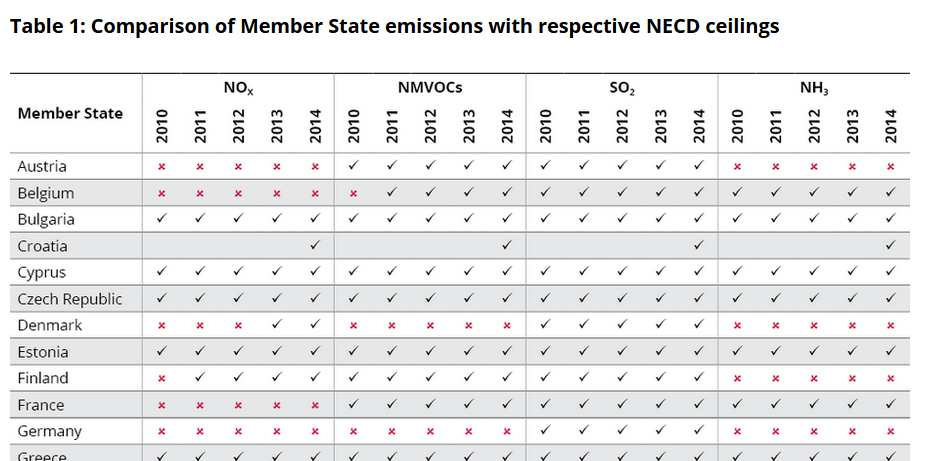Call for changes to Climate Action Plan / State dispute over power grid
Reuters
“Gabriel hints at changes to environment minister’s climate action plan”
Based on statements by Germany’s economy minister Sigmar Gabriel, Reuters reports there could be changes to the enivronment ministry's draft of the Climate Action Plan 2050. The draft has elicited conflicts with "many" and resolving the details and debating its pros and cons will take some time, Gabriel said in Berlin on Thursday. However, all actors want the plan, which lays a pathway for Germany’s decarbonisation and sets targets for 2030 and 2050, he said. The government originally wanted to decide on the plan in summer 2016.
Read the CLEW factsheet on the Climate Action Plan 2015 including details on the latest draft version.
Frankfurter Allgemeine Zeitung
“States against tougher climate targets”
The economy ministers of Germany’s 16 states have (with the exception of Hesse) warned that the draft version of the Climate Action Plan 2050 poses high risks for Germany as an industrialised economy, the Frankfurter Allgemeine Zeitung reports. The ministers said the plan needed to quantify the effect of climate measures on growth and employment and ensure that its measures wouldn’t put Germany at a competitive disadvantage compared to other European countries. The industry association BDI asked for a thorough re-write of the plan.
Read the CLEW factsheet on the Climate Action Plan 2015 including details on the latest draft version.
Süddeutsche Zeitung
“The power lines of the others”
The governments of the states of Lower Saxony and Bavaria blame each other for shortcomings in expanding the country’s power grid to cope with wind power development, writes the Süddeutsche Zeitung. “Wind energy in the north has stalled because of the failure of Lower Saxony to develop the local extra-high voltage grid. […] Bottlenecks do not primarily exist between the north and the south, but in the north itself,” Bavarian economy minister Ilse Aigner said in a press release. Lower Saxony’s environment minister Stefan Wenzel on the other hand blamed Bavaria’s “total blockade” of the important north-south direct current transmission lines.
Read the press release by Ilse Aigner in German here.
Read the CLEW factsheet German federalism: In 16 states of mind over the Energiewende.
European Environment Agency
“Ten countries continue to breach National Emission Ceilings Directive limits”
10 Member States continue to emit pollutants such as Nitrogen oxide, Ammonia and NMVOCs above legal limits, writes the European Environment Agency in a press release. Germany was the only EU member state that exceeded three out of its four individual emission ceilings under the National Emission Ceilings Directive (NECD) in 2014 (NOx, NMVOCs and NH3) – and has done so consistently since 2010.
Read the press release in English here.
Find the full NEC Directive status report 2015 in English here.
Nature
“Energy hit”
The German government’s move to slow down the expansion of renewables with its reformed Renewable Energy Act is a sensible one, science magazine Nature argues in an editorial. Controversies about how renewables are best supported will not “derail the grand decarbonisation project that is underway,” the author says. But Germany’s case illustrates that the transition must be backed by “comprehensive energy plans” in order to improve networks, have efficient storage and more flexible conventional plants in a system dominated by renewables.
Read the editorial in English here.
Handelsblatt
“Offshore wind: The next subsidy ruin”
Offshore wind power will probably remain the most expensive form of green energy by far over the next decade, writes Franz Hubik in Handelsblatt. Major energy companies signed an offshore wind declaration a few days ago, saying that with an expansion of at least 4,000 megawatts of additional capacity per year and the right regulatory framework, offshore wind power could be fully competitive with new conventional power by 2025. But until that point, many expensive wind parks would need to be built and paid for by consumers.
Read the article in German here.
die tageszeitung
“The next German president should finally be someone able to spell eco”
In an opinion piece in the tageszeitung, Bernhard Pötter calls for a candidate with more of an environmental profile to succeed current German president Joachim Gauck. “Nobody is better suited to be an ambassador of sustainability" than the person occupying the (largely ceremonial) role of German President, he writes. There are "no practical constraints, no consideration of crazy coalition partners, access to the media, companies, civil society, foundations, think tanks. We have to take advantage of this,” writes Pötter. Gauck announced this week that he would not be running for a second term.
die tageszeitung
Dangers of wind parks to birds
Perhaps six percent of common buzzards in the northern German state of Schleswig-Holstein die each year from collisions with wind turbines, according to partial results of a new, unpublished study presented at a conference, writes the tageszeitung. The study, commissioned by the federal economics ministry, has been finished for a couple of months, but not yet released. Its aim is to shed scientific light on the extent to which wind power parks endanger birds.
Read the article in German here.

